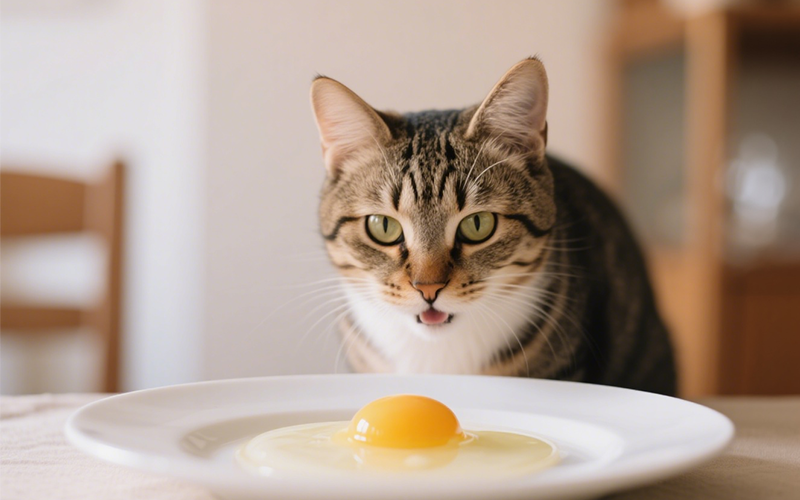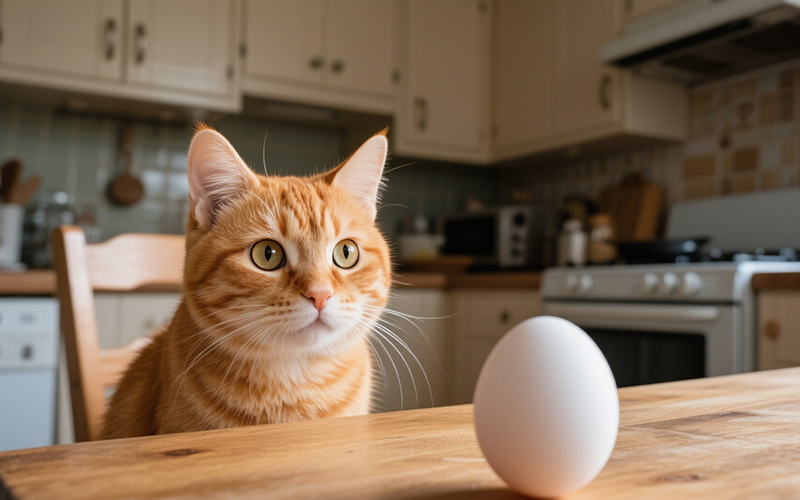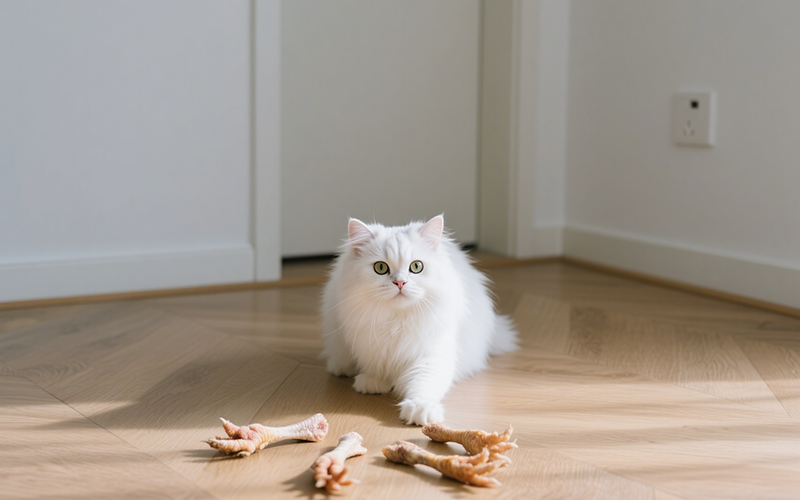Can Cats Eat Egg Yolk Raw? A Vet's In-Depth Guide to Feline Nutrition & Safety
- 10 Jun 2025 10:30
Can Cats Eat Egg Yolk Raw? A Vet's In-Depth Guide to Feline Nutrition & Safety
The Nutritional Powerhouse: Why Egg Yolks Attract Cat Owners

It's easy to understand the appeal of egg yolks. They are nature's perfect little capsules of life-sustaining nutrients, many of which are incredibly beneficial for an obligate carnivore like a cat. Before we dive into the risks, let's appreciate why this topic is so popular. A single egg yolk is packed with:
High-Quality Protein: Cats thrive on animal-based protein. It's essential for building and maintaining strong muscles, repairing tissues, and supporting overall body function. Egg protein is highly digestible and contains all the essential amino acids a cat needs.
Healthy Fats: The yolk is rich in fats, including omega-3 and omega-6 fatty acids. These are not the "bad" fats; they are vital energy sources that also play a crucial role in nutrient absorption and maintaining a healthy, lustrous coat and supple skin.
A Treasure Trove of Vitamins: Egg yolks are an excellent source of fat-soluble vitamins like Vitamin A (crucial for vision, and immune function), Vitamin D (for bone health and calcium regulation), Vitamin E (a powerful antioxidant), and B vitamins like B12 (for nerve function and digestion) and Biotin (for skin and coat health).
Essential Minerals: Yolks also provide important minerals like iron, selenium, and zinc, which support everything from red blood cell production to immune responses and metabolic function.
For cats, these nutrients translate into tangible benefits: a shinier coat, healthier skin, stronger muscles, and better energy levels. The argument for feeding raw is often that cooking can slightly degrade some of these delicate vitamins. However, this marginal nutritional benefit must be weighed against significant and potentially life-threatening risks.
"While the nutritional profile of a raw egg yolk is impressive, the primary responsibility of any pet owner or veterinarian is to 'first, do no harm.' The documented risks of bacterial contamination from raw eggs often outweigh the perceived benefits of a 'natural' diet."
The Big Debate: Raw vs. Cooked Egg Yolks for Cats
The heart of the matter lies in a simple trade-off: the minimal nutrient loss from cooking versus the significant health risks of feeding raw. Let's break down both sides of the argument from a scientific and safety-oriented perspective.
The Risks of Raw: A Veterinarian's Primary Concern
This is the most critical section for any responsible pet owner. While some cats might eat a raw egg yolk and seem fine, it's a game of chance. The primary dangers are not hypothetical; they are well-documented public health concerns.
1. Bacterial Contamination: Salmonella and E. coli
The most significant threat posed by raw eggs is pathogenic bacteria. Salmonella and E. coli can be present on the shell of an egg and can even contaminate the inside of the egg before the shell is even formed.
Salmonellosis in Cats: If a cat ingests Salmonella bacteria, it can lead to an infection called salmonellosis. While some healthy adult cats may be asymptomatic carriers, others can become severely ill. Symptoms include severe vomiting, diarrhea (which may be bloody), fever, lethargy, dehydration, and loss of appetite. Kittens, senior cats, and cats with compromised immune systems are at a much higher risk of developing a life-threatening illness.
Zoonotic Risk: This is a crucial point for your entire household. Salmonella is zoonotic, meaning it can be transmitted from animals to humans. A cat that eats contaminated raw egg yolk can shed the bacteria in its feces and saliva. This bacteria can then contaminate its litter box, food bowls, and your home, posing a risk to every human in the house, especially children, the elderly, and immunocompromised individuals. The risk isn't just to your pet; it's to your family.
2. The Avidin Issue: A Risk of Biotin Deficiency
You may have heard that raw eggs can cause a biotin (Vitamin B7) deficiency. This is true, but the culprit is specifically in the raw egg white, not the yolk. Raw egg whites contain a protein called avidin. Avidin binds very strongly to biotin, preventing its absorption in the intestines.
While the yolk itself is a fantastic source of biotin, feeding a whole raw egg or allowing the white to mix with the yolk introduces avidin into the equation. Over time, this can lead to a deficiency, causing issues like dry, flaky skin, a dull and brittle coat, and poor growth. While feeding only the yolk mitigates this specific risk, the potential for cross-contamination from the white during separation is always present. Cooking denatures the avidin, rendering it completely harmless.
The Safer Alternative: Cooked Egg Yolks
Given the risks, the veterinary community overwhelmingly recommends feeding cooked eggs to cats. Cooking to a safe internal temperature effectively eliminates the threat of Salmonella and E. coli and neutralizes the avidin in any residual egg white.
The good news is that the nutritional loss from cooking is minimal. The high-quality protein, healthy fats, and most of the essential minerals remain intact. While some B vitamins can be slightly reduced by heat, the yolk remains a wonderfully nutritious treat. Scrambling or boiling the egg yolk is a simple, safe, and effective way to share this food with your cat without worry.
Answering Your Core Question: So, Can Cats Eat Egg Yolk Raw?

After weighing the evidence, the professional and responsible answer is: No, it is not recommended for cats to eat raw egg yolk.
The potential for severe bacterial infection in your cat and the subsequent risk of transmission to your human family members are far too significant to ignore. The marginal nutritional benefit of keeping the yolk raw is not a fair trade for the health and safety of your pet and household. While the internet is full of anecdotal stories of cats thriving on raw diets, it's crucial to rely on scientific evidence and veterinary consensus. Asking "can cats eat egg yolk raw" is a valid question, but the safest answer is to always cook it first.
How to Safely Prepare Egg Yolks for Your Cat
So, you've decided to take the safe route! Here’s how you can prepare this nutritious treat for your cat in a way that's both delicious for them and worry-free for you.
Cooking Methods
Hard-Boiled: This is one of the easiest methods. Simply hard-boil an egg, peel it, and separate the cooked yolk from the white. You can then crumble the yolk over their regular food or offer small pieces as a special treat.
Scrambled: You can scramble an egg yolk in a non-stick pan. Crucially, do not add any salt, pepper, oil, butter, milk, or cheese. These additives can cause digestive upset and are unhealthy for cats. Cook it plain until it's firm.
Portion Control is Key
Even though it's healthy, egg yolk is high in calories and fat. It should be considered a treat, not a meal replacement. A great guideline is the "10% rule," which states that treats should not make up more than 10% of your cat's total daily caloric intake.
For an average-sized adult cat, this means a serving of about a quarter to half of one cooked egg yolk, given only once or twice a week, is a reasonable amount. Overfeeding can lead to obesity and may unbalance their carefully formulated regular diet.
Sourcing Your Eggs
While cooking is the most important safety step, the source of your eggs still matters. Opting for organic or pasteurized eggs can provide an extra layer of confidence. Pasteurized eggs have been gently heated to kill bacteria, making them an even safer choice if you have any lingering concerns.
Nutritional Breakdown: Egg Yolk for Cats
To fully appreciate the benefits of a properly prepared egg yolk, let's look at its key components in a clear, digestible format.
| Nutrient | Benefit for Cats | Important Note |
| Protein | Essential for muscle growth, tissue repair, and overall health. | Highly digestible and beneficial when cooked. |
| Fats (incl. Omega-3s) | Concentrated energy source; promotes healthy skin and a shiny coat. | Feed in moderation due to high caloric content. |
| Vitamin A | Supports vision, immune function, and fetal development. | Essential for carnivores who cannot synthesize it from beta-carotene. |
| Vitamin D | Helps regulate calcium and phosphorus for strong bones. | Cats cannot synthesize Vitamin D from sunlight, so it must be in their diet. |
| Biotin (B7) | Crucial for healthy skin, coat, and metabolic processes. | Best absorbed from cooked yolk to avoid avidin from the white. The query "can cats eat egg yolk raw" is linked to this, but cooking solves the problem. |
When to Avoid Eggs Completely
Even cooked egg yolk isn't suitable for every cat. You should avoid feeding eggs to cats with certain health conditions:
Kidney Disease: Cats with kidney or renal issues often need a diet with controlled phosphorus and protein levels. Egg yolks are high in both, so they should only be given under the explicit direction of a veterinarian.
Pancreatitis: The high fat content in egg yolks can trigger a painful flare-up in cats prone to or diagnosed with pancreatitis.
Obesity: For cats on a strict weight-management plan, the extra calories from egg yolk can sabotage their progress.
Egg Allergies: Though uncommon, some cats can be allergic to eggs. Signs of a food allergy include itchy skin, over-grooming, skin infections, or gastrointestinal upset like vomiting and diarrhea. If you notice any of these signs after introducing egg yolk, stop feeding it immediately and consult your vet.
Introducing PettureX: Your 24/7 AI Vet Assistant
Navigating the complexities of your cat’s diet and health can sometimes feel overwhelming. What if you introduce a new food like cooked egg yolk and notice a slight change in your cat's stool? What if you see a new skin rash and you're not sure if it's an allergy or something else? This is where modern technology can be an incredible ally for pet parents.
We recommend downloading the PettureX app. Think of it as your intelligent assistant for pet wellness. PettureX empowers you with several powerful features right on your phone:
AI Health Analysis: Simply take a picture of a concern—be it a skin lesion, an eye issue, or something in the litter box—and the app's powerful AI can provide an initial analysis and information on potential issues.
24/7 AI Vet Consultation: Have a pressing question at 2 AM? The AI-powered vet consultant is always online to help you understand symptoms, provide guidance on when a situation is an emergency, and offer peace of mind.
Species Identification: While you already know you have a cat, this feature showcases the app's powerful recognition technology, which can identify a vast range of animal species from a photo.
Using a tool like PettureX can help you make more informed, less panicked decisions about your pet’s health. It’s the perfect first step to take when you notice something is off, helping you gather information before you call or visit your veterinarian.
Frequently Asked Questions (FAQ)
Can kittens eat raw egg yolk?
Absolutely not. Kittens have underdeveloped immune systems that are extremely vulnerable to bacteria like Salmonella. A bacterial infection that might only cause mild illness in a healthy adult cat could be fatal for a kitten. Stick to a high-quality, veterinarian-approved kitten formula and avoid all raw foods.
What about just the raw egg white for my cat?
This is even worse than the yolk. Raw egg white should never be fed to a cat. It offers less nutritional value than the yolk and contains the protein avidin, which actively blocks the absorption of essential biotin, leading to potential health problems with their skin and coat.
My cat just licked some raw egg off the counter! What should I do?
First, don't panic. A single small lick of raw egg is unlikely to cause a serious problem for a healthy adult cat. The risk increases with the amount consumed. Remove any remaining raw egg and simply monitor your cat closely for the next 24-48 hours. Watch for any signs of gastrointestinal distress like vomiting, diarrhea, or lethargy. If you notice any of these symptoms, contact your veterinarian for advice. This is another great scenario to use the PettureX app to check symptoms and get immediate AI-driven advice.
How much cooked egg yolk is too much for a cat?
Moderation is everything. A whole egg yolk is too much for a single serving. For a typical 10-pound cat, a quarter of a yolk (or about one teaspoon, crumbled) once or twice a week is a safe and healthy treat. Always introduce new foods slowly and in small amounts to see how your cat tolerates them.
Conclusion: A Balanced Treat, Not a Daily Staple
To circle back to our original, critical question: can cats eat egg yolk raw? The evidence-based, safety-first answer is a firm no. The risks of Salmonella and other bacterial contaminations are simply too great for both your feline friend and your human family.
However, this doesn't mean eggs are off the menu! A cooked egg yolk, served plain and in moderation, is a fantastic, nutrient-dense treat that can significantly benefit your cat's health, from its shiny coat to its strong muscles. By choosing to cook the yolk, you eliminate all the major risks while retaining the vast majority of the nutritional benefits.
Always prioritize your cat's safety, consult with your veterinarian before making significant changes to their diet, and embrace the joy of providing healthy, safe, and delicious treats for your cherished companion.
Related

Can Cats Eat Dog Kibble? Unpacking the Nutritional Mismatch!
- 29 May 2025
Can Cats Eat Deli Turkey? Slicing Through the Facts for Your Feline!
- 29 May 2025
Can Cats Eat Deer Meat? Exploring Venison for Your Feline!
- 28 May 2025
Can Cats Eat Corned Beef? Unpacking This Salty Human Delicacy!
- 28 May 2025
Can Cats Eat Cooked Rice? The Grain Truth for Your Feline Friend!
- 27 May 2025
Can Cats Eat Cornbread? A Crumb of Truth for Curious Cat Owners!
- 27 May 2025
Can Cats Eat Cooked Meat? Sizzling Facts for Your Feline's Feast!
- 26 May 2025
Can Cats Eat Chili? Spicing Up the Truth About This Human Dish!
- 26 May 2025
Can Cats Eat Chicken Eggs? Cracking the Code on This Feline Food Query!
- 24 May 2025
Can Cats Eat Chicken Feet? A Paw-sitive or Negative Treat?
- 24 May 2025
